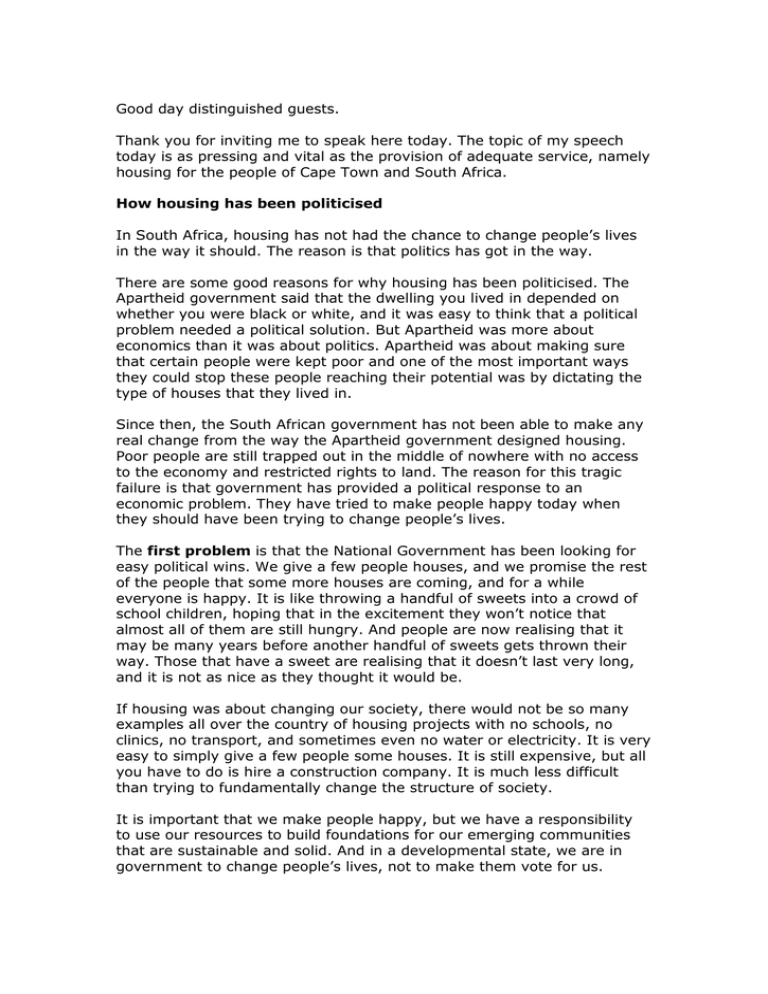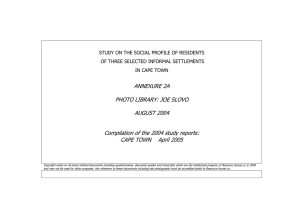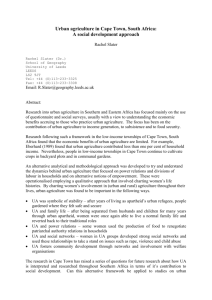Good day distinguished guests.
advertisement

Good day distinguished guests. Thank you for inviting me to speak here today. The topic of my speech today is as pressing and vital as the provision of adequate service, namely housing for the people of Cape Town and South Africa. How housing has been politicised In South Africa, housing has not had the chance to change people’s lives in the way it should. The reason is that politics has got in the way. There are some good reasons for why housing has been politicised. The Apartheid government said that the dwelling you lived in depended on whether you were black or white, and it was easy to think that a political problem needed a political solution. But Apartheid was more about economics than it was about politics. Apartheid was about making sure that certain people were kept poor and one of the most important ways they could stop these people reaching their potential was by dictating the type of houses that they lived in. Since then, the South African government has not been able to make any real change from the way the Apartheid government designed housing. Poor people are still trapped out in the middle of nowhere with no access to the economy and restricted rights to land. The reason for this tragic failure is that government has provided a political response to an economic problem. They have tried to make people happy today when they should have been trying to change people’s lives. The first problem is that the National Government has been looking for easy political wins. We give a few people houses, and we promise the rest of the people that some more houses are coming, and for a while everyone is happy. It is like throwing a handful of sweets into a crowd of school children, hoping that in the excitement they won’t notice that almost all of them are still hungry. And people are now realising that it may be many years before another handful of sweets gets thrown their way. Those that have a sweet are realising that it doesn’t last very long, and it is not as nice as they thought it would be. If housing was about changing our society, there would not be so many examples all over the country of housing projects with no schools, no clinics, no transport, and sometimes even no water or electricity. It is very easy to simply give a few people some houses. It is still expensive, but all you have to do is hire a construction company. It is much less difficult than trying to fundamentally change the structure of society. It is important that we make people happy, but we have a responsibility to use our resources to build foundations for our emerging communities that are sustainable and solid. And in a developmental state, we are in government to change people’s lives, not to make them vote for us. The second problem is that the national government has allowed narrow-minded political ideologies to intrude into a place where clear thinking is extremely important. You hear people saying things like ‘Having a house without a garden or yard is not African, and that is why we cannot have high density housing’. This is despite the fact that the people living in that house have made their own high-density housing by building shacks in their backyards and renting them out. And it is despite the fact that high-density housing is an essential tool for good city planning. Housing is a very emotional issue. I can understand that it is easy to make mistakes. When I go out and engage with poor communities, housing is almost always the number one priority. As Mayor of Cape Town and a Mayoral Committee Member for Housing before that, I have to deal with enormous pressure. People’s dreams are about housing. But we ignore reality at our peril, especially when we dealing with the day to day problems of how people live, work and move around. There is no room for romantic notions that take us nowhere or obscure our view of what is actually going on. The third problem is that the National Government has often taken a cynical, short-term approach to national planning. Despite overwhelming evidence, they steadfastly refuse to acknowledge that urbanisation is a reality that is impossible to ignore or slow down. This refusal is motivated by a narrow politicised view that their rural voters would not accept it. If urbanisation is properly managed it can be harnessed to create industrialisation and economic growth, and it has the potential to be a very good thing for everyone. People come to the cities because they have a contribution to make. But urbanisation also creates terrible problems if there is no proper plan in place to deal with it. We can see this whenever we walk through one of our many informal settlements. We can only deal with urbanisation if we have an ambitious strategy of urban planning linked to the creation of socio-economic opportunities. Key to both of these things is the strategic management of housing provision, and recognition of what a central role it plays. If we cannot acknowledge how inevitable and important urbanisation is, then our cities will be dominated by sprawling slums which make no positive contribution to our economy and represent a tragic waste of human potential. Why housing needs to be depoliticised When housing is politicised, then housing is the only thing we are interested in. We give people houses because we have decided that giving people houses is important. But when housing is depoliticised, then housing is a tool that we use to reach our real goal, which is to build a completely new society that can provide equal opportunity, and in which we live together as one nation. There are many ways in which housing can be used as a tool to develop people. If someone has the title deed to their own house, they can get a loan from a bank and use it to create more money. They can start a business or invest in their children’s education. And they can become people who take advantage of the financial institutions which drive modern capitalism all across the world. They can become real players in the economy. If someone lives near to a financial centre, they can access the social services and economic opportunities that will allow them to not only live decent lives, but to actively participate in developing our economy in a way that benefits everyone. The same thing applies if there is a wellplanned transport system available to them near where they live. For these links between housing and the economy to happen, housing needs to be a part of long-term planning in which all roleplayers are involved. Depoliticizing housing means that housing is not just government’s responsibility; it is the responsibility of everyone who wants to see South Africa’s economy really develop. The vast majority of South Africans have almost no impact on our economic growth. If housing can be used to bring all those people into the economy and become economic players, you can imagine the incredible boost which this country will be given. The private sector, particularly big financial institutions like banks, have just as much interest in making this happen as government does. We cannot exclude those players with our short-sighted politics. National Government has not been ambitious enough. It has not dared to dream about what can really be done. It has also failed to see how important housing is. Of course, there are some exceptions. Our new Human Settlements Minister Tokyo Sexwale has stood out clearly as a minister who can speak realistically about the challenges and opportunities South Africa faces. We can only hope that his voice is not drowned out. As the City of Cape Town, we are extremely interested in working together with National Government to ensure that the provision of housing is used to its full potential. We will do everything we can to make sure party politics do not get in the way of ambitious and creative responses to the challenges we all face. There is work to be done, and everyone needs to be able to play their part. Cape Town is faced with the dual challenge of managing the need for sustainable growth and development, as well as meeting the increasing demand for housing. Increasing residential density is key in meeting these demands. The City has to maximise the use of very limited land – especially welllocated land - available for building homes for those in need. Well planned higher density residential buildings are the most viable option to effectively and efficiently solve the housing challenge in Cape Town. The key issue is well located land, which refers to land in close proximity to public transport routes, activity routes and corridors where a range of amenities and conveniences are available. This is also important from the perspective of making our public transport systems viable and encouraging developments which are not car dependent and where people can access facilities, amenities, conveniences and opportunities by foot as well as by public transport. Higher densities are also much more conducive to local economic development opportunities because small businesses will struggle less to reach economies of scale. The City is convinced that higher housing densities are essential for sustainable progress in addressing housing backlogs, as well as for effective urban planning around transport corridors. Higher densities provide significant saving in land cost per unit, as less land is needed because available land is used more efficiently. Higher densities require shorter infrastructure runs and therefore cost less installation and operation fees per consumer. Experience and best practice suggest that for storey affordable housing developments a maximum of 3-4 storeys is appropriate and sustainable. In acknowledging the housing challenge, the City is seeking more active involvement with informal communities and settlements, and active engagement will be the cornerstone of our efforts to stabilise the housing crisis and increase density. I hope that we can be an example of what can be done in municipalities around South Africa, and we look forward to working closely with National government and all interested stakeholders. Thank you.






